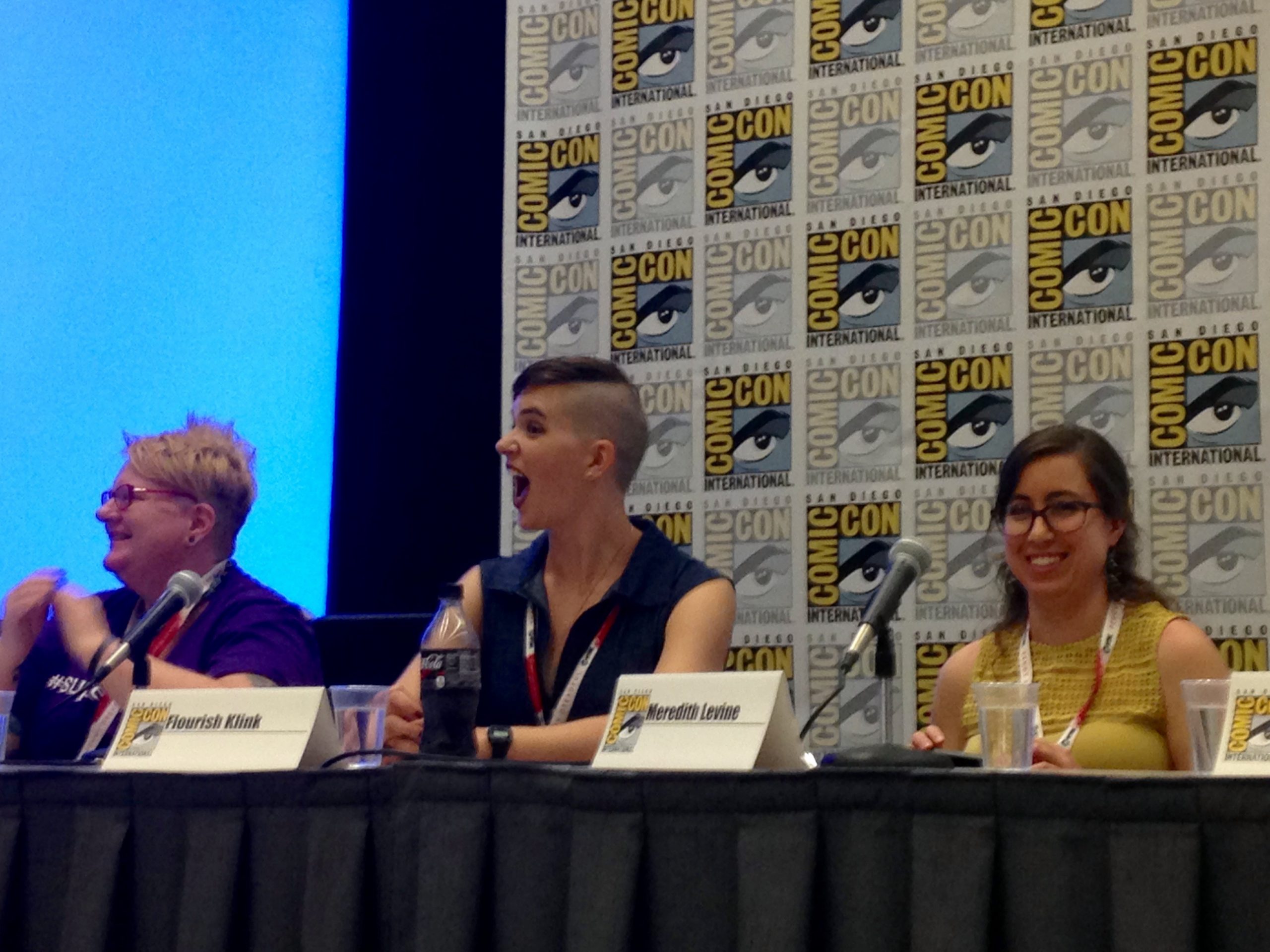10 Fantastic Quotes from the ‘Fandom Is My Fandom’ Panel at SDCC
On Thursday afternoon, in a tiny room in a tiny corner of San Diego International Comic Con was a panel called ‘Fandom Is My Fandom, or We All Live in a Coffee Shop AU’. As Coffee Shop AUs are my second favorite of ALL the AUs (nothing can beat ‘fake dating’, okay) I made it my mission to attend. Also, as you may have noticed if you’ve read any of my stuff before, I’m kind of obsessed with fandom as a concept so this panel was basically made for me.
Hosted by Heidi Tandy from FYeahCopyright and featuring a group of panelists from all aspects of fandom including representatives from some of the platforms we use to form communities, ‘Fandom Is My Fandom’ was almost everything I wanted. Really though, the only gripe I had was that I would have liked to have seen someone representing the ‘average’ fan experience. Someone that’s not in an administrative/gatekeeping position would have really rounded out the dissection a little more.
That said, the panel did raise some really interesting questions that I would love to see fandom discuss further. So in the hopes of inciting that discussion, here are some of my favorite quotes from the panel for everyone that wasn’t able to attend.
The panel began with a quote from Lev Grossman so I’ll start there. This quote is circa 2011 but, as moderator Heidi Tandy said, it’s still fairly relevant.
Do characters belong to the person who created them? Or to the fans who love them so passionately that they spend their nights and weekends laboring to extend those characters’ lives, for free? There’s a division here, a geological fault line, that looks small on the surface but runs deep into our culture, and the tectonic plates are only moving farther apart. Is art about making up new things or about transforming the raw material that’s out there?
The first topic of conversation was about where fandom is right now, which is a vague idea that in this panel manifested itself in a discussion of how technology has changed fandom. While it was fantastic to hear the perspective of people like Aron Levitz from Wattpad and Amanda Brennan from Tumblr, their answers often rode the line advertisement, which is fine because they clearly seem to believe how wonderful their product is, but it’s important to remember that they are selling a product. That said, as someone pointed out during the panel, the older platforms that are often looked back on with nostalgia never would have tried as hard as these guys are.
Anyway the point of this post is that these people are much more eloquent then me so I’ll let them speak for themselves.
Elizabeth Minkel – Journalist:
I think that the big change in that realm comes from money. From people seeing – particularly 50 Shades of Grey – and all these publishers go: “oh there must be more of that”… but there’s not really a full understanding. They can only see the end result, they can’t see the organic growth.
Aron Levitz – Wattpad:
When our founders founded the company they didn’t go: “this is going to be one of the biggest spaces for fan fiction in the world.” What they built was an amazing place to share stories, and then the fan fiction came… we had to scramble to become experts – what it showed it was that mobile has completely changed fan fiction for a lot of reasons. First of all you can be writing any time and you can be reading any time. There is this inane privacy… No matter where you are, where you go… you can access fandom 24 hours a day.
Meredith Levine – Zefr:
It’s changed since I started working at the company I work at. We do a lot of rights management and major media companies were really hesitant to have that out there and admitting and it’s since changed with the concepts of media and social media has really changed fandom because it’s really brought to the forefront of the minds of powers that be – fans can actually show up in places and say “I count, and there’s a way to count me”.
Flourish Klink – Chaotic Good Inc.:
I hope the next move is going to go from: here are some fans that we can – I don’t want to say exploit because I don’t think that’s really what I mean. Wanting to get to know the audience better so you can give them what they want better and make more money. Which is good, I like giving people money for things that I like.
Jules Wilkensin – SuperWiki:
The structure of the way fan communities work on Tumblr and on Livejournal is different because of the platforms are different. I think that’s exciting because there’s a greater diversity of those platforms. To me that’s great because it means a diversity of access to a diversity of communities. There’s still a lot of gatekeeping, there’s still a lot of lack of diversity, but the more platforms we have the space there are for those voices.
Flourish:
Some of the people that I’ve worked with have worked on major television shows and in one particular case, which I am trying not to name because I don’t want to embarrass anybody, I was talking with the person who had built their website and they were like: we opened this fan fiction section on our website how do we get people to post there? We really want them to come. And I was like: well, why do you want them there? You’ve got this huge fandom who are posting fan fiction all over, why are you not happy? No, no, because we need the views we want them to come to our site – they are getting all of those views and WE need those views… That’s not how it works. No one is going to be comfortable posting their incest fanfic on a site that is owned by the powers-that-be. That’s just not going to happen… It was this really sort of enclosing the commons kind of move that they were trying to make and I don’t think they saw it that way. There’s still this divide.”
Heidi:
We’ve tried very hard to be fair use wizards, and people generally understand that their fan fiction, fan art, their cosplay fall under the ambit of fair use. But even if it falls under fair use that doesn’t necessarily make people feel comfortable posting it on the website, especially where the powers that be’s website contains a terms of use that either takes control of it, or gives them certain licenses to it… but there’s so much misunderstanding what terms of use and there are these changes every so often. Part of that is why people are not comfortable putting their stuff out where the powers that be are going to be able to control all of it. However, when a contest comes along or a challenge comes along or a certain hashtag comes along they may be willing to put one thing or three things into that particular zone while keeping the rest of it separate from it.
Betsy Rosenblatt – Organisation of Transformative Works:
So pastiches existed for a really long time. People have been writing commercial fanworks since Arthur Conan Doyle was writing the original Sherlock Holmes canon. This has been happening for a long time, but a bunch of things have changed since that era that have made people more comfortable with doing it, more comfortable using their real names doing it. Part of it is that the technological platforms to bring people together are better. And a lot of that is that people understand the law better and the law has gotten better. I think there’s now a lot of comfort with the idea that at least non-commercial fanworks are pretty easily defined as fair use. There really isn’t a legal problem with non-commercial fanworks.
Meredith:
Every time there is a new platform you wind up a different culture because you have different features. You have different people listening, different people putting money into it so there are all sorts of different factors at play. I think it’s really easy to get caught in this trap of monolithic fandom as singular idea. When I say fandom I have an idea of what that means but somebody else could have an idea of what that means and it’s very different from mine. I think that within fandom it’s really really diverse and so you have all sorts of different cultures… It’s transient and it’s diverse but we say fandom and I think really we mean fandoms.
Betsy:
I just want to jump in on the fact that some platforms are run by rights holders and others are run by companies and others are run by independent volunteer organisations… One of the questions that comes up is: Who is making money from this? When there’s money way behind something there are I think more questions about who it’s benefiting. Those questions are often answered in very happy ways, but not always and as fandom, and the many types of fandoms hit the main stream we may want to stop and take note of the fact that money breeds censorship. Once somebody is making decisions about payment, they’re also making such decisions about content. I think one of the really great things about fan culture/fan creativity as a volunteer pursuit is that it creates the most diversity possible. And once you start funnelling it fewer flowers bloom.
Finally there was a question from the audience about maintaining fandom as a safe space and Elizabeth Minkel had a response that really resonated with me so I would love to see what everyone else though:
There was a lot of rhetoric about fandom being a safe space and that rang really false for me because, I see some of the most crazy town things in fandom and it’s not safe to me. I stopped talking in my fandom because I’m scared that someone is going to tell me to die or dox me… I appreciate that as idea and I like it as an idea but I just don’t think it exists anymore.
And just to give you the cliff notes version, here are my 10 favorite quotes from the panel.
“What technology has brought to fandom is the ability for everyone to be part of it.” – Aron
“You can build a community around anything… and fans really have a chance to change the conversation.” – Amanda
“Social media has really changed fandom because it’s really brought to the forefront of the minds of powers that be – fans can actually show up in places and say ‘I count, and there’s a way to count me.’” – Meredith
“Every single time there’s a new web 2.0 thing or a new mobile platform there’s a new way to have an organic community developing around that platform.” – Heidi
“I like giving people money for things that I like.” – Flourish
“I think a lot of what this comes down to is money… and actually I’m really happy about that.” Flourish
“Just because we’re making stuff doesn’t mean we’re out to destroy you.” – Jules
“Fan fiction for me is transformative and it pushes back and it challenges and it says these dudes are getting together. I don’t want Steven Moffat to say that’s cool, I don’t need him to.” – Elizabeth
“No matter where you are, where you go… you can access fandom 24 hours a day.” – Aron
“Fandom is a safe space and it’s a generational safe space. Generations of fans that come together and learn from each other and pass down lore and mythology within the fandom itself.” – Audience Member
Yes, that was more than 10 quotes all together, but there was so much good stuff. Just think of it as getting more bang for your buck. As I said above, I would love to see what my fellow fans thought about this discussion, so please tell me what you think in the comments.
Author: Undie Girl
Undie Girl (aka Von) has a BA (Hons) Major in Cultural Studies. The title of her honours thesis was “It’s just gay and porn”: Power, Identity and the Fangirl’s Gaze. She’s currently pursuing a Masters of Media Practice at University of Sydney. Von’s a former contributor The Backlot’s column The Shipping News and a current co-host of The Geekiary’s monthly webcast FEELINGS… with The Geekiary.
Help support independent journalism. Subscribe to our Patreon.
Copyright © The Geekiary
Do not copy our content in whole to other websites. If you are reading this anywhere besides TheGeekiary.com, it has been stolen.Read our







Wow, I really wish I’d been at that panel. Thank you for all the terrific quotes. I agree wholeheartedly that fandom is many fandoms and, depending on how you slice it, your experiences and culture (and rules) will be entirely different.